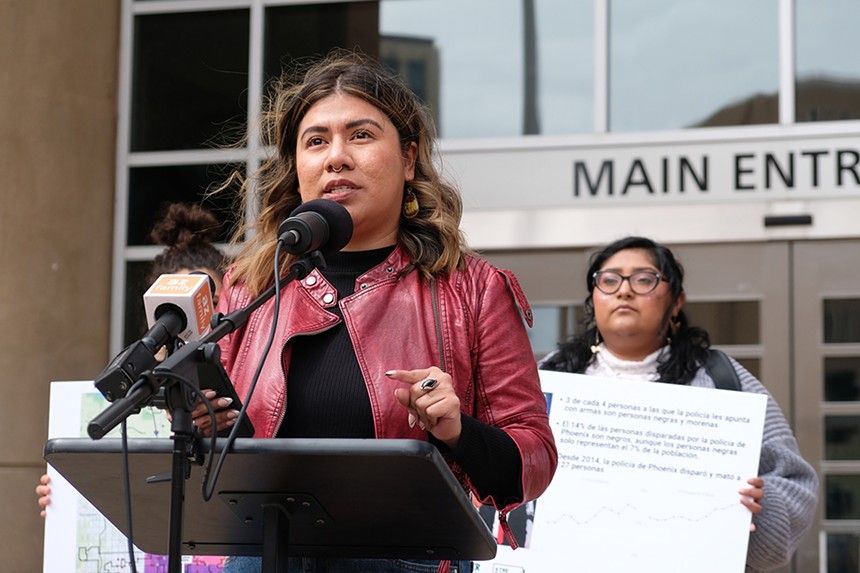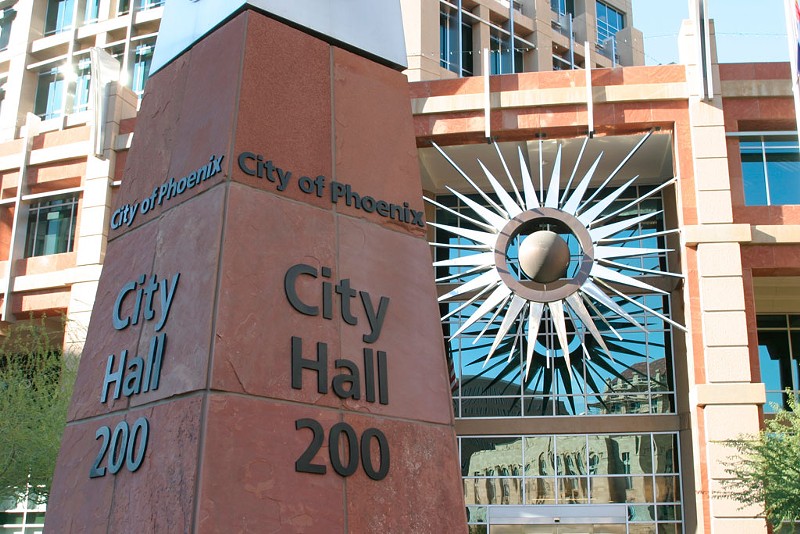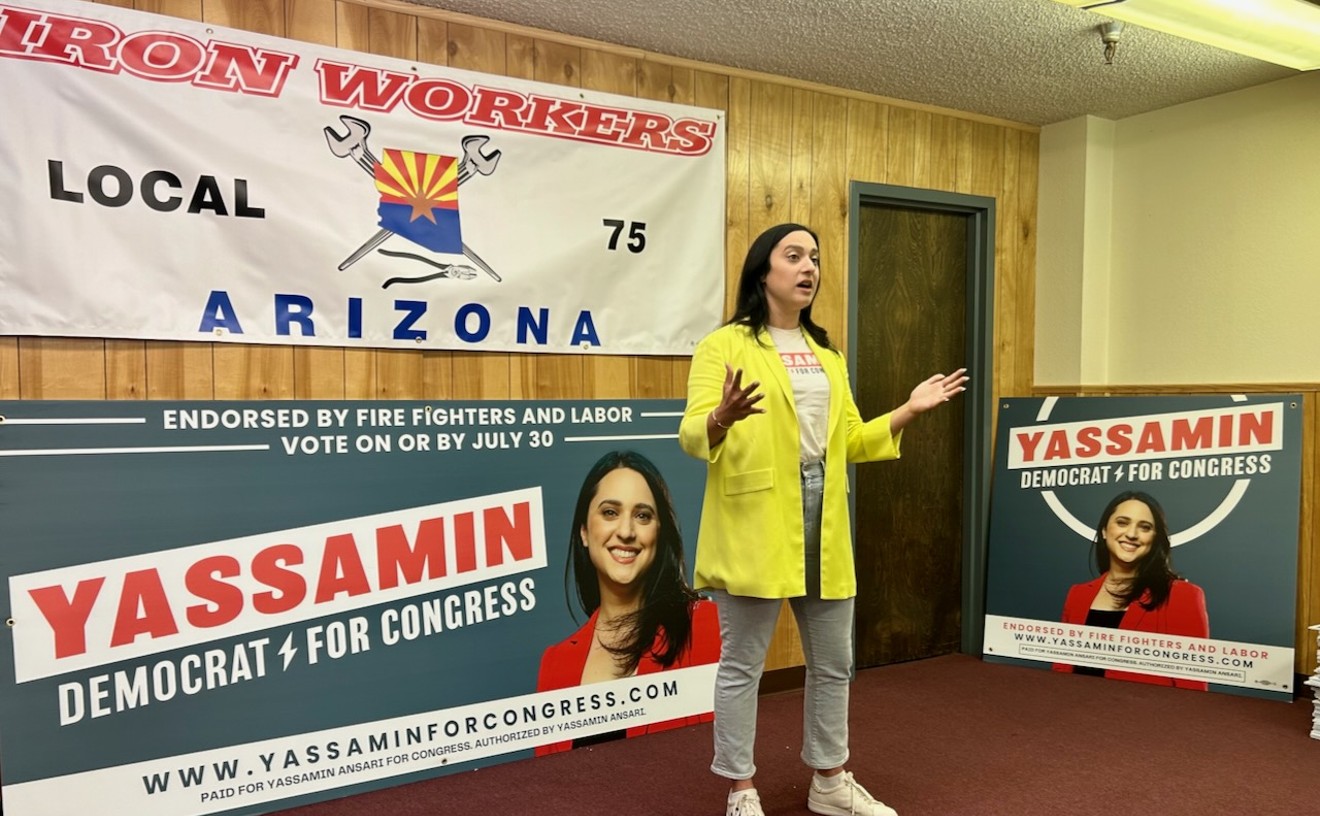But an increase in wages is only one part of a financial injection into the agency. The city plans to increase the police department's annual budget from $850 million to $979 million — a 15.2% jump, according to documents presented to the council on May 2.
The new contract with the Phoenix Law Enforcement Association came after a contentious negotiation process. At an April 19 hearing on the contract, activists protested the raises the agreement guaranteed for Phoenix officers, which will increase overall worker compensation by 4.5%.
"All of our community resources and programs are left with crumbs, while the police budget just keeps getting bigger and bigger every year," Stephani Espinosa, who works with advocacy group Poder in Action, said during the April hearing.
Councilmembers approved the contract without comment.

Viri Hernandez, executive director of Poder in Action, during a March 1 event outside Phoenix City Hall.
Katya Schwenk
Scrunity over secret negotiations
In December, the police union failed to provide a draft of its contract proposal to the public, a break from a yearslong tradition — and a violation of Phoenix city code. Even after protests from advocacy groups, the city allowed negotiations over the new police contract to proceed in secret. The new contract governs wages, disciplinary protocols and other department policies for the upcoming year. Although other unions for city employees, including the Laborers' International Union of North America and the International Association of Firefighters, also did not provide contract proposals to the public in December, activists zeroed in on the police department given the outsize power of its union in the city.
The police department's budget is far larger than that of any other department. Its current $850 million in funding dwarfs the $496 million for the fire department, the city agency with the second largest budget.
Poder in Action and conservative think tank Goldwater Institute both sued the city over the contract negotiations, arguing that the city was required to disclose the union's initial contract proposals to the public.
While a Maricopa County Superior Court judge presiding over Poder in Action's case agreed that the negotiations had violated city code, he declined to intervene. The Goldwater Institute's suit, which sought records from the city, is still ongoing.
Unlike in prior years, the new police contract will last for only one year and includes few significant policy changes. The one notable change is an update to language about misconduct investigations to make the new contract align agency protocol with state law.
However, the contract did guarantee a 2.16% base wage increase for all Phoenix officers, as well as a one-time payout of about 5% of officers' annual salaries. While all unions that renegotiated contracts with the city saw an overall 4.5% increase in pay, the raises for Phoenix cops comes after major pay raises last year.
In June 2022, the city spent $19.8 million on salary adjustments for Phoenix officers. The starting salary of police recruits increased by about $20,000. Cops across the department received raises in the tens of thousands of dollars — and the city now touts the Phoenix Police Department as one of highest paid law enforcement agencies in Arizona.

Phoenix police officers will see a 4.5% wage increase this year. It is the second time in less than a year that Phoenix cops have received a pay bump.
Matt Hennie
City proposes major police budget hike
A City Council policy meeting on May 2 gave the first detailed look into the city's plans for the police budget in the next fiscal year, which begins July 1. The city budget will not be finalized until June and is subject to change. Should the proposed budget be approved, it will represent a far bigger increase than the department has seen in recent years. Last year, the police agency saw a $63 million — or 8% — increase. This year, the city is proposing a 15.2% annual increase, bringing the agency budget close to $1 billion for the first time. According to budget documents, at least some of the increase is due to the department's plans to add more civilian positions, including police assistants and investigators who are not sworn officers.
As the proposal currently stands, the Phoenix Police Department will make up 22.1% of the city's budget, up from 21.1% this fiscal year.
The proposed budget also includes increases to other departments, though none will see a budget hike as large as the police department. The budget for the fire department is slated to increase from $496 million to $565 million, or a 13.9% increase.
The city plans to put significantly more resources into its housing department, too. Its budget will increase from $124 million in the current fiscal year to $199 million — a 60.8% increase.
At the same time, the Human Services Department, which provides services such as emergency rent assistance, is seeing an 11.6% decrease in its budget and will reduce the current budget of $196 million to $173 million.
A city spokesperson did not reply to Phoenix New Times’ requests for comment about the budget proposal.











